The BYOD Security Market is estimated to be valued at USD 50.8 billion in 2025 and is projected to reach USD 286.6 billion by 2035, registering a compound annual growth rate (CAGR) of 18.9% over the forecast period.
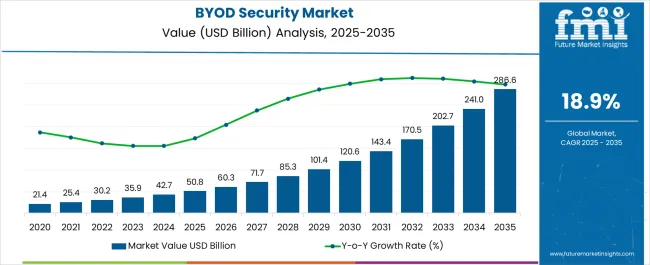
| Metric | Value |
|---|---|
| BYOD Security Market Estimated Value in (2025 E) | USD 50.8 billion |
| BYOD Security Market Forecast Value in (2035 F) | USD 286.6 billion |
| Forecast CAGR (2025 to 2035) | 18.9% |
The BYOD security market is experiencing strong momentum driven by the rapid adoption of remote and hybrid work models, alongside the rising penetration of personal devices in enterprise networks. The increasing frequency of cyber threats and data breaches has compelled organizations to prioritize robust security frameworks that can safeguard sensitive information across diverse endpoints.
Growing regulatory pressure regarding data protection and compliance has also accelerated the adoption of advanced security solutions. Continuous innovations in authentication technologies, encryption, and mobile device management are further strengthening the market.
With enterprises focusing on achieving higher operational flexibility without compromising on security, the outlook for BYOD security remains favorable, supported by continued digital transformation initiatives across industries.
The market is segmented by Device Type and Solution Type and region. By Device Type, the market is divided into Laptop, Tablet, and Smartphone. In terms of Solution Type, the market is classified into Mobile Data Security, Mobile Device Security, and Network Security. Regionally, the market is classified into North America, Latin America, Western Europe, Eastern Europe, Balkan & Baltic Countries, Russia & Belarus, Central Asia, East Asia, South Asia & Pacific, and the Middle East & Africa.
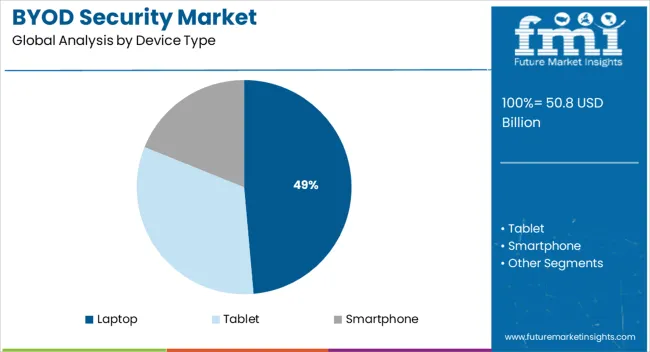
The laptop device type segment is projected to hold 48.60% of the overall market revenue by 2025, establishing it as the leading category. This prominence is attributed to the widespread use of laptops in enterprise operations and their central role in accessing sensitive corporate applications and data.
The reliance on laptops for high performance computing, collaboration, and remote working has necessitated advanced endpoint security measures. Additionally, the greater exposure of laptops to phishing, malware, and ransomware attacks compared to other devices has reinforced the demand for comprehensive protection strategies.
As organizations continue to integrate remote and mobile workforces, laptops remain the dominant device category driving security investments.
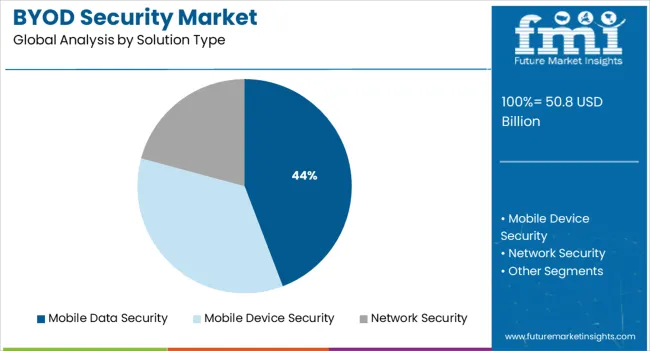
The mobile data security solution type segment is anticipated to account for 44.20% of total market revenue by 2025, positioning it as the largest within its category. The growth of this segment is being propelled by the surge in mobile device usage for both personal and professional tasks, creating heightened risks of data leaks and unauthorized access.
Organizations are increasingly investing in encryption, secure containers, and advanced mobile threat defense tools to protect corporate data on employee devices. The ability to monitor, manage, and secure mobile endpoints has become essential in reducing vulnerabilities across bring your own device environments.
As mobile devices continue to be integral to enterprise productivity, mobile data security solutions are expected to maintain their leadership in ensuring safe and compliant BYOD practices.
The CAGR for BYOD security market is expected to grow from 13.0% in 2020-22 to 18.9% in 2025 to 2035.
Around three out of every five employees under the age of 25, as well as more than half of those over the age of 30, say that the technology they use at home is superior to the tools available at work. BYOD emerged as a subset of the greater trend of IT consumerisation, in which software and hardware from the consumer realm are permitted into business premises.
This market is still in its growth stage and therefore can provide great opportunities for investors.
The CAGR for BYOD security market is expected to grow from 13.0% in 2020-22 to 18.9% in 2025 to 2035.
Around three out of every five employees under the age of 25, as well as more than half of those over the age of 30, say that the technology they use at home is superior to the tools available at work. BYOD emerged as a subset of the greater trend of IT consumerisation, in which software and hardware from the consumer realm are permitted into business premises.
This market is still in its growth stage and therefore can provide great opportunities for investors.
BYOD has various business advantages, like cost savings and ease. By implementing BYOD, businesses may improve their flexibility, mobility, and productivity. Businesses that use BYOD programmes in their offices do not need to purchase new devices or carrier plans for each employee.
Each employee is free to utilise the endpoints that they possess for work-related purposes. Some businesses may choose to pay their staff with a compensation that covers a portion or the entirety of their phone expenses.
Others may provide payment based on the employee's geographic area and the price of terminal ownership. BYOD's low cost is a key positive for firms that really are looking to implement a portability programme or are just getting started.
This market is still in introductory phase and will provide great opportunities for early investors.
Due to the widespread use of BYOD security system, North America dominates the global market for BYOD security with a market share of 28.4%.
Increasing investment in wireless technology development, a strong presence of major industry players, and growing preference for personalized workspace are some of the primary drivers driving revenue growth in this region.
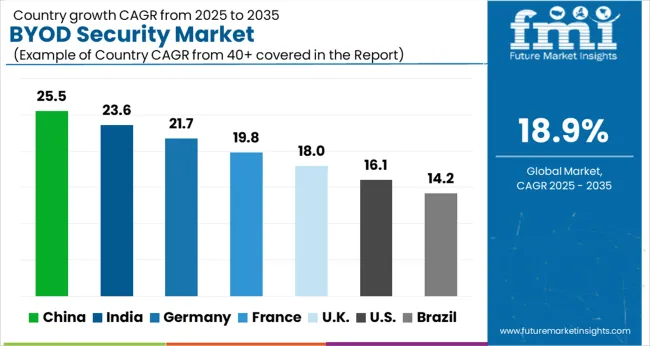
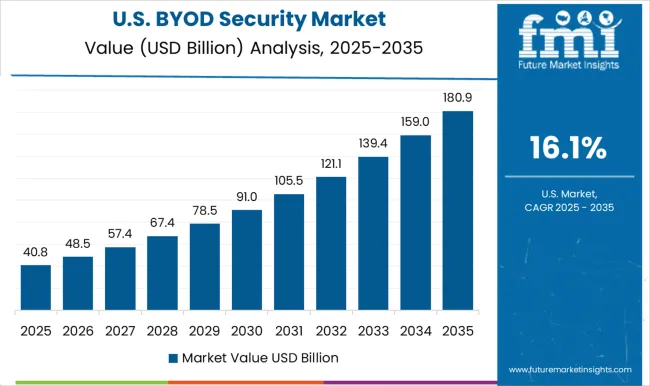
BYOD is becoming popular in companies in the USA, with several employees preferring to bring their own devices to work. This has however lead to the problem of maintaining confidentiality with these employees owned devices, in light of these events IBM, Quokka, Palo Alto Networks, Qualcomm, Zimperium have decided to collaborate with NIST to develop Mobile Security Framework, which is a framework developed for BYOD Security administration, which can be followed by companies in the US wanting to implement BYOD.
Therefore, USA held the largest market share of 24.2%in 2025.
The BYOD Security is still emerging in India; the companies that allow BYOD tend to adopt this model to cut costs and therefore dont seem to be affected by security concerns. On the other hand companies that are tight in security prefer to provide employees with work computers or use alternative models like company-owned, business-only (COBO), and company-owned, personally-enabled (COPE). However, some companies have started to see the advantage of BYOD and are planning to implement it, such companies are likely to require cybersecurity systems for their devices creating demand for BYOD security in the future.
Therefore, India has a CAGR of 17.3%for the BYOD security market over the forecast period.
According to Al-Tamimi, a UAE-based legal firm, consumers spend 3 times more on IT than corporations - smartphone adoption in the Emirati is higher than in the US. Taking advantage of the prevalence of mobile devices can boost employee productivity. UAE based firms are therefore trying to implement BYOD security applications, creating opportunities for BYOD security market in UAE,
Thus these factors allow UAE to hold a market share of 19.2%.in 2025 for the BYOD security market.
Laptops are most commonly the devices used in BYOD models as they are the most common form of personal work computers, this has led to several security techniques being developed for laptop security, such as biometric identification, smart cards and other encryption methods. These methods however restrict usage of the laptop on a personal level and therefore may not be preferable for BYOD Security. This creates an opportunity for research and development in the BYOD security for laptops fields, giving it a CAGR of 17.6%
Bringing personal devices to work brings the challenge for maintaining company confidentiality, container applications are one method for allowing employees to utilise their own devices while also minimising security threats. These are usually provided by third-party vendors. One container can contain several apps. This option gives the employee less control over their device while still offering appropriate security controls and monitoring. Therefore, Mobile Data Security is a profitable market to invest in.
These factors lead mobile data security to have the CAGR of 16.9% over the given forecast period.
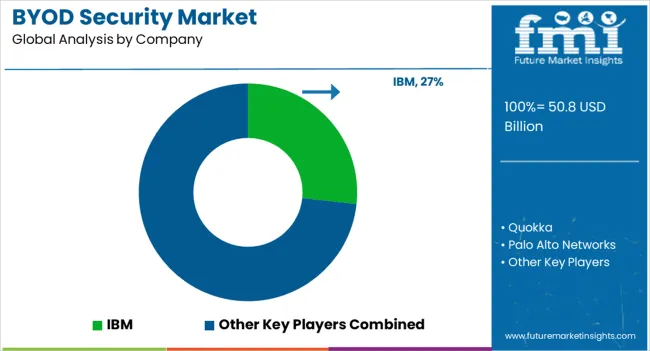
Several Companies in both developed and developing countries are emerging in the BYOD security market, this is leading the market into a position of competitiveness as no firms have been established as a top player yet.
| Attribute | Details |
|---|---|
| Market value in 2025 | USD 50.8 billion |
| Market CAGR 2025 to 2035 | 18.9% |
| Share of top 5 players | 20.5% |
| Forecast Period | 2025 to 2035 |
| Historical Data Available for | 2020 to 2025 |
| Market Analysis | USD Billion for Value |
| Key Regions Covered | North America; Latin America; Europe; South Asia Pacific; East Asia and the Middle East Africa |
| Key Countries Covered | USA, Canada, Germany, UK, France, Italy, Spain, Russia, China, Japan, South Korea, India, Australia New Zealand, GCC Countries, Turkey and South Africa |
| Key Segments Covered | Device Type, Solution Type and Region |
| Key Companies Profiled | IBM; Quokka; Palo Alto Networks; Qualcomm; Zimperium; NIST; Intel; Lenovo |
| Report Coverage | Market Forecast, Company Share Analysis, Competition Intelligence, DROT Analysis, Market Dynamics and Challenges, and Strategic Growth Initiatives |
| Customization Pricing | Available upon Request |
The global byod security market is estimated to be valued at USD 50.8 billion in 2025.
The market size for the byod security market is projected to reach USD 286.6 billion by 2035.
The byod security market is expected to grow at a 18.9% CAGR between 2025 and 2035.
The key product types in byod security market are laptop, tablet and smartphone.
In terms of solution type, mobile data security segment to command 44.2% share in the byod security market in 2025.






Full Research Suite comprises of:
Market outlook & trends analysis
Interviews & case studies
Strategic recommendations
Vendor profiles & capabilities analysis
5-year forecasts
8 regions and 60+ country-level data splits
Market segment data splits
12 months of continuous data updates
DELIVERED AS:
PDF EXCEL ONLINE
BYOD and Enterprise Mobility Market Analysis and Forecast 2025 to 2035, By Security, Software, Deployment Type, End-Use, Organization Size, and Region
Security Tape Market Size and Share Forecast Outlook 2025 to 2035
Security Alarm Communicator Market Size and Share Forecast Outlook 2025 to 2035
Security and Vulnerability Management Market Forecast and Outlook 2025 to 2035
Security Holograms Market Size and Share Forecast Outlook 2025 to 2035
Security Paper Market Size and Share Forecast Outlook 2025 to 2035
Security System Tester Market Size and Share Forecast Outlook 2025 to 2035
Security Advisory Services Market Size and Share Forecast Outlook 2025 to 2035
Security Room Control Market Size and Share Forecast Outlook 2025 to 2035
Security Cameras (IR Illuminator) Market Size and Share Forecast Outlook 2025 to 2035
Security Operation Centre as a Service Market Size and Share Forecast Outlook 2025 to 2035
Security Robots Market Size and Share Forecast Outlook 2025 to 2035
Security Service Edge Market Size and Share Forecast Outlook 2025 to 2035
Security and Surveillance Equipment Market Size and Share Forecast Outlook 2025 to 2035
Security Orchestration Automation and Response (SOAR) Market Size and Share Forecast Outlook 2025 to 2035
Security Bags Market Size and Share Forecast Outlook 2025 to 2035
Security Screening Market Analysis - Size, Share, and Forecast 2025 to 2035
Security Bottles Market Size and Share Forecast Outlook 2025 to 2035
Security Inspection Market Insights – Trends & Forecast 2025 to 2035
Security Labels Market Analysis by Product Type, Material, Pattern, Application, End-Use Industry, and Region Through 2035

Thank you!
You will receive an email from our Business Development Manager. Please be sure to check your SPAM/JUNK folder too.
Chat With
MaRIA